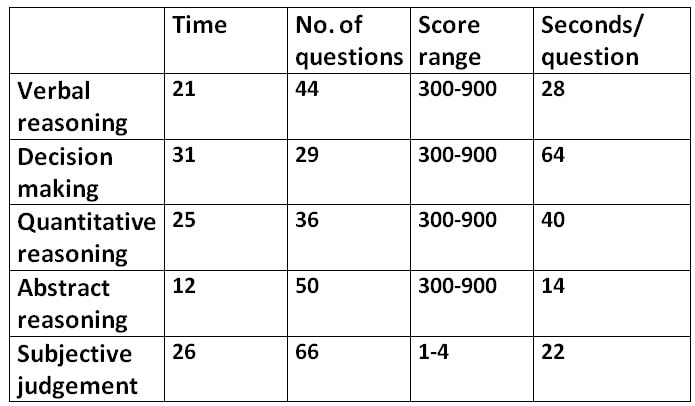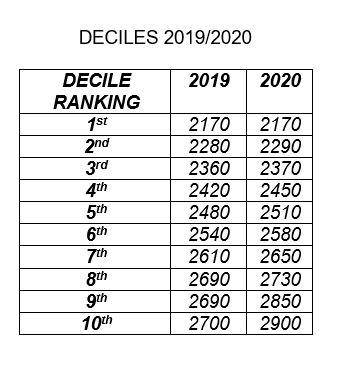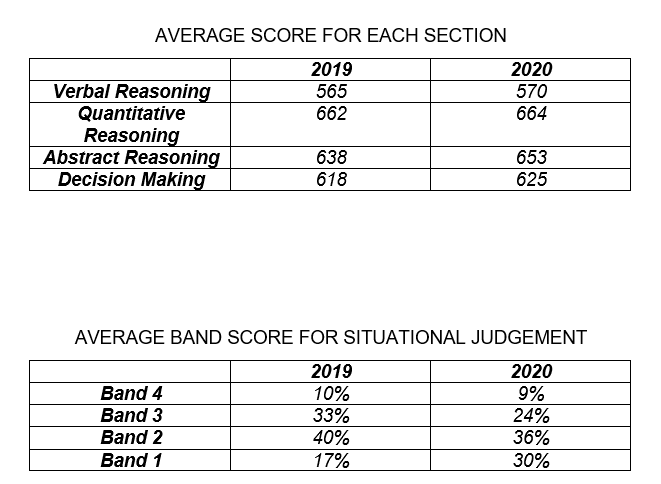UCAT 2024Choose from an in person course or a live online course.

The UCAT is a 2-hour aptitude test taken online. https://www.ucat.ac.uk/ It consists of five sections 1.Verbal reasoning 2.Decision making 3.Quantitative reasoning 4.Abstract reasoning 5.Situational judgement There is a slightly new format introduced in 2022, with the following changes 1. QR has one more minute, 25 min in total. 2. AB has five less questions, down from 55 to 50, with one less minute. 3. SJ has three less questions, down from 69 to 66. Time is the same. Additionally as well there is a new question format introduced to SJ. This new question will give candidates a number of factors, usually 3, and ask them to identify the most and the least important of the selection in terms of a given scenario. It is assumed that there will be three questions of this style. In reality, practicing past paper questions should give you the skills to answer this type of question. The first 4 sections are scored on a scale of 400-900 (total 3600) and the last section, situational judgement is scored on a band scale 1-4 with 1 being the highest. STRUCTURE Once started no opportunity for a break + each section is timed separately (in following order i.e. can’t move between subtests) - but there is 1min between each section to read the instructions for the next section (which you will already be familiar with) There are 33 medical schools that require the UCAT REGISTRATION Registration 14/05/24-19/09/24 - UCAT makes it very clear they will not make exceptions to this so don’t leave it too late! Best to book early to get the most choice over slots - make an account on the UCAT Pearson Vue official website: UCAT Booking Page - Official UCAT SCORING You will receive a score of between 300 and 900 for each of the 4 main sections. Your result is an average of the 4 sections. The fifth section, Situational Judgement is scored on a range band 1-4. Each mark is based on correct answers in each section (i.e NOT negatively marked). Overall score between 1200 - 3600. The average score for :- 2021 625 (2150) and 14% Band 1 2022 624 (2380) and 20% Band 1 2023 629 (2610) and 18% Band 1 SJT is only used in borderline cases Test statistics published at the end of each assessment period with the cohort split in to bands (usually 10 deciles but some universities split into 12) - being in top decile advantageous for application process, other unis use system with a cut off score to reach the next round of the application process e.g. Newcastle Usually 2600 = roughly average Above 2720 often in top 2 deciles A score in the tenth decile means that you are in the top ten percent. If you score in the first decile this means that you will be in the bottom ten percent of all candidates. The average UCAT score is generally between 615 – 635. In 2020, the UCAT average score was 628. Anything above 640 is regarded as a good score. However, each university puts a different emphasis on a different score. Our webinar
The webinar comes with a 100 page e-book packed with lots of techniques and examples. One of the main hurdles is time management. You are asked to complete 225 questions in 120 minutes which is further broken down as Verbal reasoning 28s/question Decision making 64s/question Quantitative reasoning 40s/question Abstract reasoning 14s/question Situational Judgement 22s/question We will give you time saving techniques accompanied with lots of timed practice Additionally, with multiple choice questions, it can be good to use the elimination technique where one or two answers can quickly be eliminated and narrowing down your choice of answer. In some cases, it may be better to look at the questions before reading the passage or looking at the graphs/tables as this can focus your mind on where to find the answer. You will also find that there is additional material provided that is not relevant to the questions. The test is an aptitude test, probably unlike anything that you have seen before and the key is to tackle it fully prepared ?
UCAT – Your questions answered. 1.Where can I do the test? Pearson state that the UCAT will be delivered in Pearson test centres throughout the UK and internationally. However if the pandemic situation changes, there are contingency plans to support testing if required. 2.When can I do the test? Registration opens on 14 May 2024 and the first test is available on 8 July 2024. The last date available to sit the UCAT is 26 September 2024. www.ucat.ac.uk/register/ 3. How many times can I sit the UCAT? You may only sit the UCAT once a year. However you can re-sit it the following years and the UCAT scores are only valid for one year only. 4. Tell me about the actual test The multiple choice test is taken on a computer or laptop and is 2 hours long, consisting of 225 questions split into five sections Verbal reasoning 21 minutes Decision making 31 minutes Quantitative reasoning 23 minutes Abstract reasoning 13 minutes Situational judgement 26 minutes There is a 1 minute reading time between each section. 5.How much does the UCAT test cost? The cost is £70.00 There are bursaries available UCAT Bursary Scheme 6.How do I find out my UCAT score? When you sit the UCAT test, you will find out the score immediately upon completion. You can also access your results through your UCAT Pearson Vue log in account. 7.What is the average UCAT score? Last year, 2023, it was 2610. In 2019 it was 2483 and for 2021 it was 2512 for the first 4 sections. Situational Judgement is awarded as Bands 1 to 4, with Band 1 the highest score Which universities use the UCAT Some universities set a threshold mark and others do not put as much weight onto the UCAT score. Some will consider your score in conjunction with your interview, Personal statement, work experience and other personal qualities. You will need to check the universities website. Here is a list of the universities that use UCAT. 8. Can I prepare for the UCAT? The answer is Yes. All the studies show that familiarity and lots of practice with good strategies can vastly improve your score in aptitude tests. By following our 3-step programme and taking our live webinar where we will teach you the methods, techniques and time management to enable you to score high in the test. 9. What is the difference between the UCAT and the BMAT? Both are different tests, the UCAT test is an online aptitude test that focuses on answering questions of varying difficulty in a very tight time frame. The BMAT is a written exam which tests logical thinking, mathematics and science. It is required by Ox-bridge universities and other top medical schools 10.Why us? This course is developed by teachers who have been examiners in conjunction with Oxbridge medics. The course will be taught in an interactive and engaging way and expect to be worked hard on the day. Our aim is to guide you through your preparation for this exam, where we are very conscious to take into account your anxieties and dread. This test will probably be new to you and not like any of the exams that you did at GCSE or A level. So, we have developed a 3 step plan that takes you methodically through the process. We are very confident that by following this plan, your goal will be achieved. One of the main hurdle is time management. You are asked to complete 233 questions in 120 minutes which is further broken down as Verbal reasoning 28s/question Decision making 64s/question Quantitative reasoning 40s/question Abstract reasoning 14s/question Situational Judgement 22s/question We will give you time saving techniques accompanied with lots of timed practice Additionally, with multiple choice questions, it can be good to use the elimination technique where one or two answers can quickly be eliminated and narrowing down your choice of answer. In some cases, it may be better to look at the questions before reading the passage or looking at the graphs/tables as this can focus your mind on where to find the answer. You will also find that there is additional material provided that is not relevant to the questions. The test is an aptitude test, probably unlike anything that you have seen before and the key is to tackle it fully prepared. You will definitely score much higher by taking our course. We want to help you. Finally both our courses and UCAT bundle are the best value on the market. |



